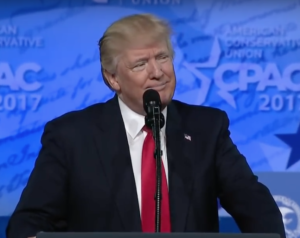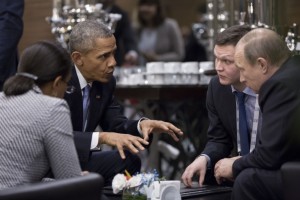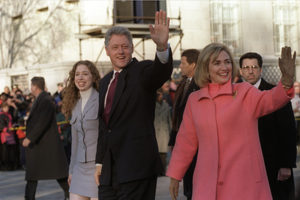Official Washington Tips into Madness
by Robert Parry - Consortium News
March 6, 2017
 The intensifying hysteria over Russia has pushed Official Washington over the edge into outright madness. On one side of this asylum, you have the Democrats, neoconservatives and mainstream media, while on the other, you have the embattled Trump administration.
The intensifying hysteria over Russia has pushed Official Washington over the edge into outright madness. On one side of this asylum, you have the Democrats, neoconservatives and mainstream media, while on the other, you have the embattled Trump administration.Both sides have been making grave allegations with little or no evidence to support them.
President Donald Trump delivering remarks at CPAC on
Feb. 24, 2017. (Screen shot from Whitehouse.gov)
The Democratic/neocon/MSM side has pushed the conspiracy theory that Donald Trump’s campaign colluded with Russians to put the real-estate mogul in the White House, but there is, as yet, no evidence that such a thing happened.
Even one of the top advocates feeding this Russia frenzy, New York Times correspondent Thomas L. Friedman, acknowledged on Sunday on NBC’s “Meet the Press” that “I agree, there is no evidence,” but then added: “which is why we need a special prosecutor or an independent commission to get to the bottom of it.”
But that is not how investigations are supposed to work. You’re supposed to have evidence of wrongdoing and then examine it in the investigative phase to see if the evidence withstands scrutiny. What Friedman is suggesting is more like a “fishing expedition” or a “witch hunt.”
The drip-drip of this investigative water torture finally got to President Trump last week as he flew down to his winter home at Mar-a-Lago. He joined the crazy melee early Saturday morning by sending out a flurry of tweets accusing President Obama of wiretapping Trump Tower in New York City in the weeks before the Nov. 8 election. Trump also offered no evidence while demanding an investigation to get to the bottom of this.
By contrast, in all the major investigations that I have handled as an investigative reporter, such as Oliver North’s secret White House paramilitary operation; the related Nicaraguan Contra drug trafficking scandal; Richard Nixon interference with President Lyndon Johnson’s Vietnam peace talks in 1968; and Ronald Reagan’s campaign sabotage of President Jimmy Carter’s Iranian-hostage negotiations in 1980 – there was substantial evidence from eyewitnesses and documents supporting the suspicions before the story was published.
At no point would I have argued that just because Oliver North met a Contra leader that it was time to investigate whether he and his Reagan administration superiors were breaking the law. I first found multiple insiders, including people in the U.S. government and the Contra movement, describing how North was running his back-channel war. In some of these investigative situations, we had two dozen or so sources describing detailed aspects of these operations before we made any allegations in print.
Now the argument is that because some people suspect something, even without evidence, major investigations are warranted. That is usually what a conspiracy theory sounds like. Someone claims not to understand how something could have happened a certain way and thus a full-scale inquiry is needed into some highly unlikely and speculative scenario.
Opening Salvos
In the case of the Russia investigation, the opening salvos came from President Obama’s intelligence agencies, which alleged that Russia had “hacked” Democratic emails and slipped the contents to WikiLeaks, but the agencies offered nothing in the way of U.S. government evidence to support that supposition.
President Barack Obama meets with President Vladimir Putin
of Russia on the sidelines of the G20 Summit in Antalya, Turkey,
Nov. 15, 2015. National Security Advisor Susan E. Rice listens at left.
(Official White House Photo by Pete Souza)
The two reports that were issued were heavy on the word “assesses” – which in intelligence jargon usually means “guesses” – but short on anything that could be checked out or verified.
The Jan. 6 report, issued by the Office of the Director of National Intelligence, admitted as much, saying, “Judgments are not intended to imply that we have proof that shows something to be a fact. Assessments are based on collected information, which is often incomplete or fragmentary, as well as logic, argumentation, and precedents.”
Meanwhile, WikiLeaks representatives denied getting the two batches of Democratic emails from Russia, suggesting that two different American insiders had leaked the material.
Yet, despite this dubious send-off, the “scandal” careened into the area of “secondary” offenses, such as the conversation between Trump’s National Security Adviser-designate Michael Flynn and Russian Ambassador Sergey Kislyak which was intercepted by the National Security Agency on Dec. 29, 2016.
Rather than redact Flynn’s name as “minimization” procedures usually require for an American citizen who is inadvertently picked up on an intelligence wiretap, the transcript was given to the FBI which then tested Flynn’s memory of the conversation and found it wanting.
The Flynn case should be of particular concern to civil libertarians because it shows how NSA whistleblower Edward Snowden’s warning of a “turnkey tyranny” could work, with the Surveillance State monitoring phone calls and then finding flimsy legal excuses to justify an FBI probe – in Flynn’s case the never-tested-in-court 1799 Logan Act was used – and then manufacturing the crime of lying to the FBI if a person’s memory doesn’t match with the NSA transcript.
For Flynn, who was on vacation in the Dominican Republic when Kislyak called and thus didn’t have his usual support network with him, the immediate penalty for lacking total recall of the conversation was to lose his job. But there is still pressure for him to be prosecuted.
Similar demands have come from Democrats who want Attorney General Jeff Sessions to resign and face prosecution for perjury over his clumsy answer to a question about the Trump campaign’s possible collusion with Russia to which Sessions claimed he had not met with Russians (although it turned out he had two conversations with Kislyak, one a group meeting with several ambassadors at the Republican National Convention and the other in his Capitol Hill office with aides present.
Again, there is no evidence that Sessions conspired with Kislyak on any plans to have the Russians undercut Hillary Clinton’s campaign, an unlikely possibility in either of the two settings. But Sessions is under fire for lying about the seemingly innocuous meetings – and there are demands that the Sessions-Kislyak contacts be investigated, too. In this Russia case, the absence of evidence appears not to be evidence for the absence of a special prosecutor.
On “Meet the Press” on Sunday, President Obama’s Director of National Intelligence James Clapper also said he was unaware of evidence that the Trump campaign had colluded with the Russians.
Moderator Chuck Todd asked, “Does intelligence exist that can definitively answer the following question, whether there were improper contacts between the Trump campaign and Russian officials?”
Clapper: “We did not include any evidence in our report, and I say, ‘our,’ that’s N.S.A., F.B.I. and C.I.A., with my office, the Director of National Intelligence, that had anything, that had any reflection of collusion between members of the Trump campaign and the Russians. There was no evidence of that included in our report.”
Todd: “I understand that. But does it exist?”
Clapper: “Not to my knowledge. … at the time [of the report in early January], we had no evidence of such collusion.”
Bill Clinton Echoes
In many ways, what is happening now to Trump reminds me of the situation in 1992-93 at the start of Bill Clinton’s presidency when Republicans were furious that they had lost the White House after 12 years of Ronald Reagan and George H.W. Bush. They considered Clinton an unworthy interloper and sought to cripple his presidency from the outset by pursuing one investigation after another.
President Bill Clinton, First Lady Hillary Clinton and
daughter Chelsea parade down Pennsylvania Avenue
on Inauguration Day, Jan. 20, 1997. (White House photo)
During the campaign, President Bush and his team even suggested that the Arkansas governor may have been a KGB mole because of a student trip to Moscow in 1970. The idea was to portray the trip to the Soviet Union as prima facie evidence of Clinton’s disloyalty even though there was no evidence of any wrongdoing by Clinton.
Back then, Bill Clinton countered that smear by accusing the elder President Bush of stooping to the tactics of Sen. Joe McCarthy, the infamous Red-baiter from the 1950s. But today’s Democrats apparently feel little shame in whipping up an anti-Russian hysteria and then using it to discredit Trump, who – like Bill Clinton in 1992 – is being forced to fend off vague accusations that he is some kind of Manchurian candidate.
However, unlike Bill Clinton who seemed able to “compartmentalize” between governing as president and sparring with Republicans over their unending accusations, Trump lashed out in a flurry of Twitter messages accusing President Obama of wiretapping phones at Trump Tower.
“Terrible! Just found out that Obama had my ‘wires tapped’ in Trump Tower just before the victory,” Trump said.
“Nothing found. This is McCarthyism!” Trump added: “This is Nixon/Watergate. Bad (or sick) guy!”
In making this extraordinary charge against his predecessor, Trump offered no evidence to back it up, leaving the impression that he may have gleaned this information from the right-wing Breitbart News web site which published an article summarizing claims by conservative radio talk show hosts. Trump and White House officials then called for an investigation into Obama’s alleged wiretapping.
Obama’s spokesman Kevin Lewis responded with a statement of dubious veracity, saying: “neither President Obama nor any White House official ever ordered surveillance on any U.S. citizen. Any suggestion otherwise is simply false.” However, Obama did more than surveil at least one U.S. citizen; he had an American Al Qaeda operative Anwar al-Awlaki not just put under surveillance but killed by a drone attack in 2011 in Yemen.
Reacting to all these crazy exchanges, a Wall Street Journal editorial even managed to make some sense. Entitled “Washington Goes Nuts,” the editorial said:
“What the country desperately needs are some grown-ups to intervene, discover the facts, and then lay them out to the American people,” both regarding any untoward contacts between Russian officials and Trump’s advisers and whether the Obama administration crossed any lines in its zeal to nail Trump’s team over Russia.
The Journal’s editors expressed hopes the congressional intelligence committees could step up and perform this function. But the problem with the Journal’s idea is that it will be hard, if not impossible, to find the requisite “adults” in Official Washington where traditional standards of evidence and fair play have long since disappeared.
Investigative reporter Robert Parry broke many of the Iran-Contra stories for The Associated Press and Newsweek in the 1980s. You can buy his latest book, America’s Stolen Narrative, either in print here or as an e-book (from Amazon and barnesandnoble.com).



No comments:
Post a Comment